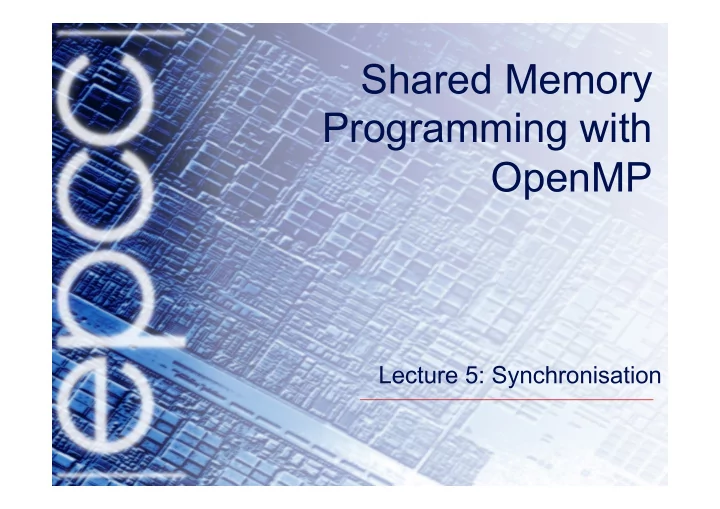

Shared Memory Programming with OpenMP Lecture 5: Synchronisation
Why is it required? Recall: • Need to synchronise actions on shared variables. • Need to ensure correct ordering of reads and writes. • Need to protect updates to shared variables (not atomic by default) 2
BARRIER directive • No thread can proceed past a barrier until all the other threads have arrived. • Note that there is an implicit barrier at the end of DO/FOR, SECTIONS and SINGLE directives. • Syntax: Fortran: !$OMP BARRIER C/C++: #pragma omp barrier • Either all threads or none must encounter the barrier: otherwise DEADLOCK!! 3
BARRIER directive (cont) Example: !$OMP PARALLEL PRIVATE(I,MYID,NEIGHB) myid = omp_get_thread_num() neighb = myid - 1 if (myid.eq.0) neighb = omp_get_num_threads()-1 ... a(myid) = a(myid)*3.5 !$OMP BARRIER b(myid) = a(neighb) + c ... !$OMP END PARALLEL • Barrier required to force synchronisation on a 4
Critical sections • A critical section is a block of code which can be executed by only one thread at a time. • Can be used to protect updates to shared variables. • The CRITICAL directive allows critical sections to be named. • If one thread is in a critical section with a given name, no other thread may be in a critical section with the same name (though they can be in critical sections with other names). 5
CRITICAL directive • Syntax: Fortran: !$OMP CRITICAL [ ( name ) ] block !$OMP END CRITICAL [ ( name ) ] C/C++: #pragma omp critical [ ( name ) ] structured block • In Fortran, the names on the directive pair must match. • If the name is omitted, a null name is assumed (all unnamed critical sections effectively have the same null name). 6
CRITICAL directive (cont) Example: pushing and popping a task stack !$OMP PARALLEL SHARED(STACK),PRIVATE(INEXT,INEW) ... !$OMP CRITICAL (STACKPROT) inext = getnext(stack) !$OMP END CRITICAL (STACKPROT) call work(inext,inew) !$OMP CRITICAL (STACKPROT) if (inew .gt. 0) call putnew(inew,stack) !$OMP END CRITICAL (STACKPROT) ... !$OMP END PARALLEL 7
ATOMIC directive • Used to protect a single update to a shared variable. • Applies only to a single statement. • Syntax: Fortran: !$OMP ATOMIC statement where statement must have one of these forms: x = x op expr, x = expr op x, x = intr ( x, expr ) or x = intr ( expr, x ) op is one of + , * , - , / , .and. , .or. , .eqv. , or .neqv. intr is one of MAX , MIN , IAND , IOR or IEOR 8
ATOMIC directive (cont) C/C++: #pragma omp atomic statement where statement must have one of the forms: x binop = expr, x ++ , ++ x, x -- , or -- x and binop is one of + , * , - , / , & , ^ , << , or >> • Note that the evaluation of expr is not atomic. • May be more efficient than using CRITICAL directives, e.g. if different array elements can be protected separately. • No interaction with CRITICAL directives 9
ATOMIC directive (cont) Example (compute degree of each vertex in a graph): #pragma omp parallel for for (j=0; j<nedges; j++){ #pragma omp atomic degree[edge[j].vertex1]++; #pragma omp atomic degree[edge[j].vertex2]++; } 10
Lock routines • Occasionally we may require more flexibility than is provided by CRITICAL directive. • A lock is a special variable that may be set by a thread. No other thread may set the lock until the thread which set the lock has unset it. • Setting a lock can either be blocking or non-blocking. • A lock must be initialised before it is used, and may be destroyed when it is not longer required. • Lock variables should not be used for any other purpose. 11
Lock routines - syntax Fortran: USE OMP_LIB SUBROUTINE OMP_INIT_LOCK(OMP_LOCK_KIND var ) SUBROUTINE OMP_SET_LOCK(OMP_LOCK_KIND var ) LOGICAL FUNCTION OMP_TEST_LOCK(OMP_LOCK_KIND var ) SUBROUTINE OMP_UNSET_LOCK(OMP_LOCK_KIND var ) SUBROUTINE OMP_DESTROY_LOCK(OMP_LOCK_KIND var ) var should be an INTEGER of the same size as addresses (e.g. INTEGER*8 on a 64-bit machine) OMP_LIB defines OMP_LOCK_KIND 12
Lock routines - syntax C/C++: #include <omp.h> void omp_init_lock(omp_lock_t *lock); void omp_set_lock(omp_lock_t *lock); int omp_test_lock(omp_lock_t *lock); void omp_unset_lock(omp_lock_t *lock); void omp_destroy_lock(omp_lock_t *lock); There are also nestable lock routines which allow the same thread to set a lock multiple times before unsetting it the same number of times. 13
Lock example Example (compute degree of each vertex in a graph): for (i=0; i<nvertexes; i++){ omp_init_lock(lockvar[i]); } #pragma omp parallel for for (j=0; j<nedges; j++){ omp_set_lock(lockvar[edge[j].vertex1]); degree[edge[j].vertex1]++; omp_unset_lock(lockvar[edge[j].vertex1]); omp_set_lock(lockvar[edge[j].vertex2]); degree[edge[j].vertex2]++; omp_unset_lock(lockvar[edge[j].vertex2]); } 14
Exercise: Molecular dynamics • The code supplied is a simple molecular dynamics simulation of the melting of solid argon. • Computation is dominated by the calculation of force pairs in subroutine forces . • Parallelise this routine using a DO/FOR directive and critical sections. – Watch out for PRIVATE and REDUCTION variables. – Choose a suitable loop schedule • Extra exercise: can you improve the performance by using locks, or atomics, or by using a reduction array (C programmers will need to implement this “by hand”). 15
Recommend
More recommend